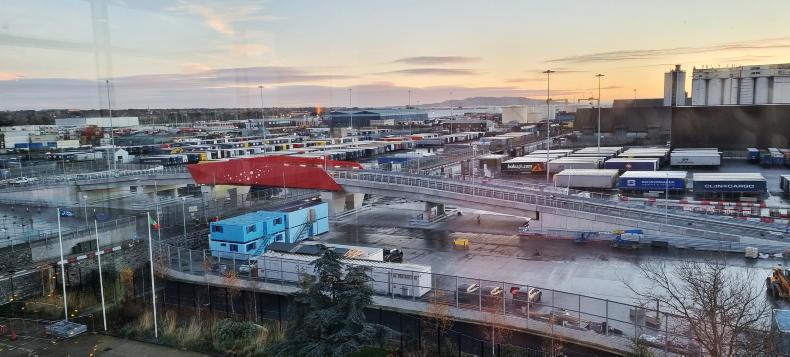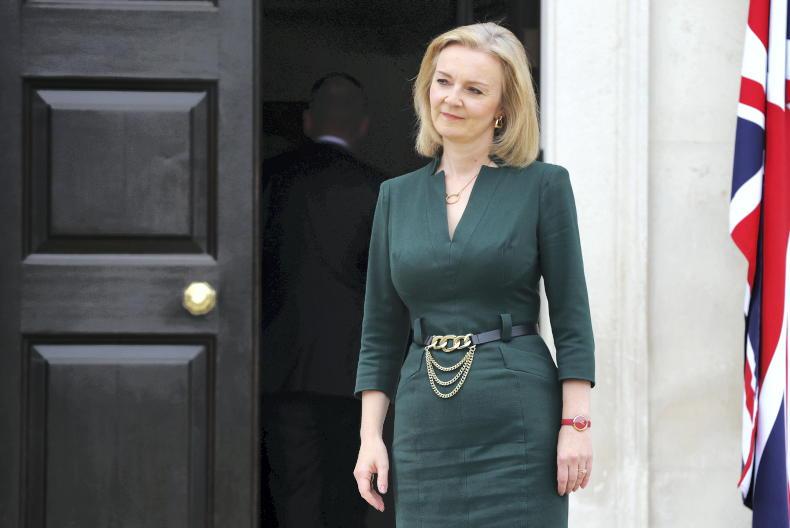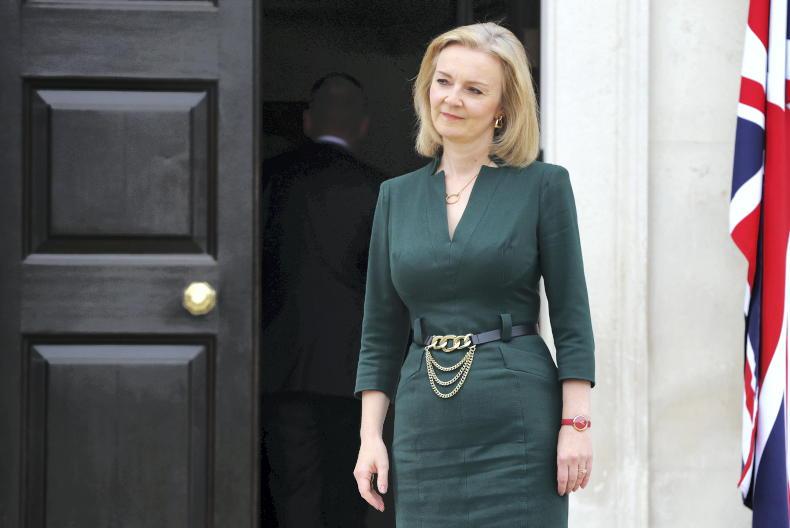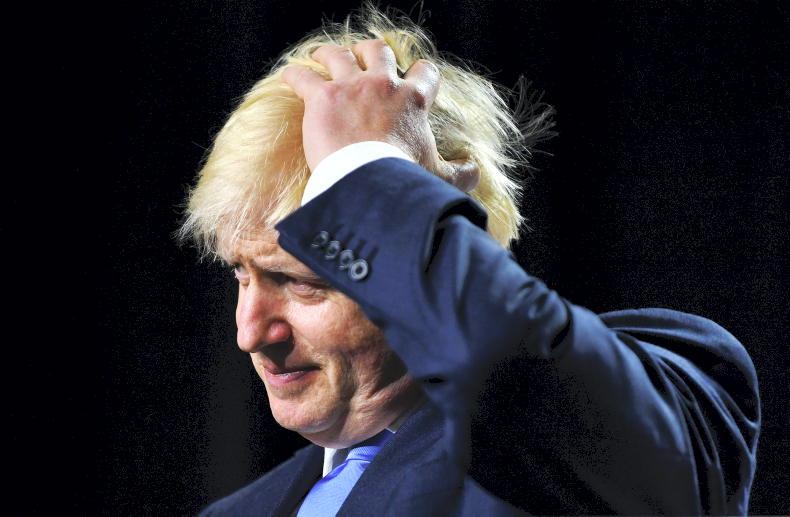In what is labelled as (another) crunch week in EU-UK discussions about the Northern Ireland Protocol, the new UK lead negotiator, Foreign Secretary Liz Truss, has made it clear that the she is prepared to use the Article 16 clause to suspend part of the protocol.
This would be a huge political and symbolic gesture but in practical terms it will make little difference to what is there at the moment.
If the Article 16 clause is used, it simply means suspension while intensive negotiations take place to solve the problem.
Given the level of exclusions that have been allowed, it would mean no practical difference to the situation as it stands.
If that worst-case scenario occurred, then it is the nightmare outcome for farmers on both sides of the border on the island of Ireland
The big threat to farmers comes from how the EU might act in response. It has been suggested that failure to resolve protocol issues threatens the very existence of the Trade and Co-operation Agreement itself.
If that worst-case scenario occurred, then it is the nightmare outcome for farmers on both sides of the border on the island of Ireland.
Cross-border trade would become immediately unfeasible due to the exceptionally high level of tariffs on agri food.

Brexit has had no impact so far on Irish exports.
That would mean a stop to the one-third of northern milk and 400,000 lambs that go south for processing and the 100,000 cattle and over 300,000 pigs that go north to factories each year.
Beef remains exposed
The most exposed sector of all remains Irish beef production. As this week’s Bord Bia figures for 2021 show, the UK is by a huge distance the main export market for Irish beef. While all sectors of Irish agriculture export to the UK, the volume and exposure is much less and there are viable market alternatives for everything apart from beef.
This nightmare scenario has been contemplated several times since the UK voted to leave the EU back in 2016, but it has never happened.
However, with instability and uncertainty around the operation of the NI protocol, the threat remains and farmers have to live with the uncertainty.
While the UK Foreign Secretary took an aggressive position in a weekend newspaper interview, it should be remembered that no negotiator would display any level of weakness when speaking publicly.
The UK government has already demonstrated some flexibility with licences for French fishing boats
In fact, the opposite is often the case in negotiations – a tough public stand in advance is often used as cover to make the compromises required to get the deal done.
The UK government has already demonstrated some flexibility with licences for French fishing boats and they have also relented somewhat on immigration rules for key workers.
The Foreign Secretary has also a record of getting deals done and in terms of access for agricultural produce for Australia and New Zealand, has demonstrated considerable generosity.
Route to solution
If the UK is in the mood for a solution, it is meeting the EU at a time when it has finally demonstrated a level of flexibility not available at the start of 2021 or during the original negotiations on the protocol.
The ultimate solution, of course, is to be found in the UK aligning with the EU on sanitary and phytosanitary controls
It is simply impractical to impose decades-old rules on internal market movements that were designed for huge consignments of single products traded internationally.
The ultimate solution, of course, is to be found in the UK aligning with the EU on sanitary and phytosanitary (SPS) controls.
This would eliminate the need for the expensive and bureaucratic procedures of manually completing certificates for every single consignment and it would work both ways for both importers and exporters in the UK.
Among the hardest hit sectors of the British food industry are the small specialised producers of animal origin products that were exported in significant quantities to the EU. This business has simply had to stop because it was no longer financially viable.
Practical politics
The UK could still adopt this approach and while it might appear to be a political U-turn, it is unlikely to cause any great reaction as the wider public are not as obsessed with the fine detail of Brexit in the way that political commentators are.
Immigration is a much more sensitive issue with the public than SPS rules yet there wasn’t a murmur on the relaxation of rules to admit food industry and healthcare workers.
It would also neatly solve any political issues in Northern Ireland as it would be a UK-wide policy.
For Liz Truss, a deal maker, aligning the UK with the EU on SPS issues would be the step to eliminate the Irish Sea border issues at a stroke and in the process give British food exporters the break they need.
In what is labelled as (another) crunch week in EU-UK discussions about the Northern Ireland Protocol, the new UK lead negotiator, Foreign Secretary Liz Truss, has made it clear that the she is prepared to use the Article 16 clause to suspend part of the protocol.
This would be a huge political and symbolic gesture but in practical terms it will make little difference to what is there at the moment.
If the Article 16 clause is used, it simply means suspension while intensive negotiations take place to solve the problem.
Given the level of exclusions that have been allowed, it would mean no practical difference to the situation as it stands.
If that worst-case scenario occurred, then it is the nightmare outcome for farmers on both sides of the border on the island of Ireland
The big threat to farmers comes from how the EU might act in response. It has been suggested that failure to resolve protocol issues threatens the very existence of the Trade and Co-operation Agreement itself.
If that worst-case scenario occurred, then it is the nightmare outcome for farmers on both sides of the border on the island of Ireland.
Cross-border trade would become immediately unfeasible due to the exceptionally high level of tariffs on agri food.

Brexit has had no impact so far on Irish exports.
That would mean a stop to the one-third of northern milk and 400,000 lambs that go south for processing and the 100,000 cattle and over 300,000 pigs that go north to factories each year.
Beef remains exposed
The most exposed sector of all remains Irish beef production. As this week’s Bord Bia figures for 2021 show, the UK is by a huge distance the main export market for Irish beef. While all sectors of Irish agriculture export to the UK, the volume and exposure is much less and there are viable market alternatives for everything apart from beef.
This nightmare scenario has been contemplated several times since the UK voted to leave the EU back in 2016, but it has never happened.
However, with instability and uncertainty around the operation of the NI protocol, the threat remains and farmers have to live with the uncertainty.
While the UK Foreign Secretary took an aggressive position in a weekend newspaper interview, it should be remembered that no negotiator would display any level of weakness when speaking publicly.
The UK government has already demonstrated some flexibility with licences for French fishing boats
In fact, the opposite is often the case in negotiations – a tough public stand in advance is often used as cover to make the compromises required to get the deal done.
The UK government has already demonstrated some flexibility with licences for French fishing boats and they have also relented somewhat on immigration rules for key workers.
The Foreign Secretary has also a record of getting deals done and in terms of access for agricultural produce for Australia and New Zealand, has demonstrated considerable generosity.
Route to solution
If the UK is in the mood for a solution, it is meeting the EU at a time when it has finally demonstrated a level of flexibility not available at the start of 2021 or during the original negotiations on the protocol.
The ultimate solution, of course, is to be found in the UK aligning with the EU on sanitary and phytosanitary controls
It is simply impractical to impose decades-old rules on internal market movements that were designed for huge consignments of single products traded internationally.
The ultimate solution, of course, is to be found in the UK aligning with the EU on sanitary and phytosanitary (SPS) controls.
This would eliminate the need for the expensive and bureaucratic procedures of manually completing certificates for every single consignment and it would work both ways for both importers and exporters in the UK.
Among the hardest hit sectors of the British food industry are the small specialised producers of animal origin products that were exported in significant quantities to the EU. This business has simply had to stop because it was no longer financially viable.
Practical politics
The UK could still adopt this approach and while it might appear to be a political U-turn, it is unlikely to cause any great reaction as the wider public are not as obsessed with the fine detail of Brexit in the way that political commentators are.
Immigration is a much more sensitive issue with the public than SPS rules yet there wasn’t a murmur on the relaxation of rules to admit food industry and healthcare workers.
It would also neatly solve any political issues in Northern Ireland as it would be a UK-wide policy.
For Liz Truss, a deal maker, aligning the UK with the EU on SPS issues would be the step to eliminate the Irish Sea border issues at a stroke and in the process give British food exporters the break they need.










SHARING OPTIONS